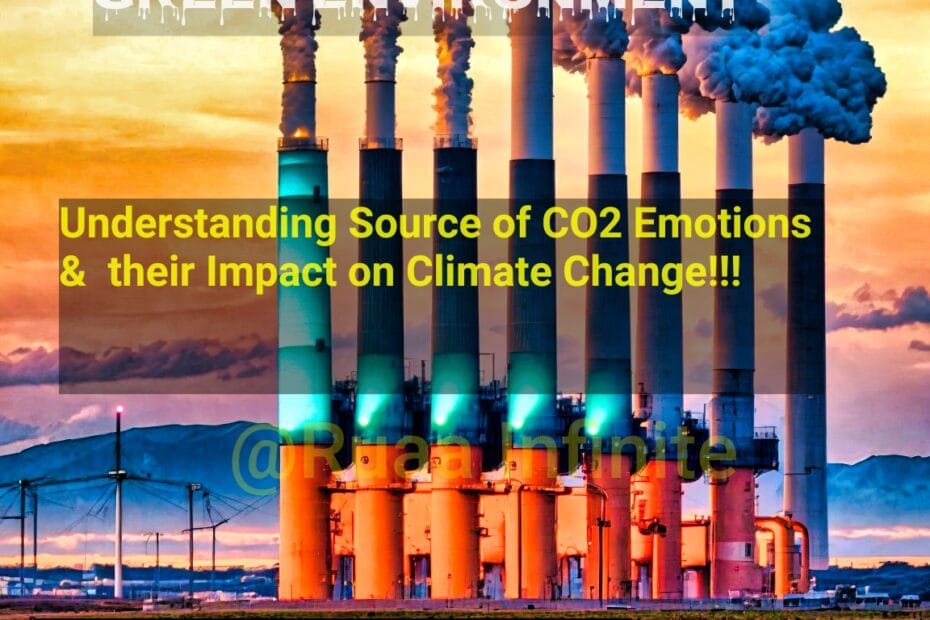Carbon dioxide (CO2) emissions stand as a significant contributor to global climate change, impacting ecosystems, weather patterns, and human health. Understanding the sources of CO2 emissions is crucial in formulating effective strategies to mitigate their adverse effects. This article delves into the primary sources of CO2 emissions, highlighting their implications and suggesting potential solutions.
Fossil Fuel Combustion:
The combustion of fossil fuels, including coal, oil, and natural gas, accounts for the largest share of CO2 emissions globally. These fuels power transportation, industries, and electricity generation. Power plants burning fossil fuels release CO2 into the atmosphere, contributing substantially to the greenhouse gas effect and global warming.
Transportation Sector:
The transportation sector, encompassing road vehicles, aviation, shipping, and railways, stands as a significant emitter of CO2. Internal combustion engines in cars, trucks, airplanes, and ships burn fossil fuels, releasing CO2 as a byproduct. The reliance on traditional gasoline and diesel engines without emissions controls amplifies the carbon footprint of this sector.
Industrial Activities:
Industries, including manufacturing, construction, and production processes, contribute substantially to CO2 emissions. Cement production, for instance, releases CO2 during the chemical transformation of limestone into clinker. Additionally, various industrial processes require high energy consumption, predominantly derived from fossil fuels, further escalating CO2 emissions.
Deforestation and Land Use Changes:
Deforestation and land use changes, primarily for agricultural purposes or urban development, disrupt natural ecosystems and reduce the planet’s capacity to absorb CO2. Trees act as carbon sinks, absorbing CO2 during photosynthesis. When forests are cleared or degraded, this natural absorption diminishes, leading to increased CO2 concentrations in the atmosphere.
Residential and Commercial Energy Use:
Heating, cooling, and electricity consumption in residential and commercial buildings contribute significantly to CO2 emissions. Dependency on fossil fuels for heating systems, appliances, and electricity generation in these sectors contributes to the overall carbon footprint.
Waste Management:
Improper waste management practices, particularly in landfills, result in the decomposition of organic waste, generating methane—a potent greenhouse gas that contributes to climate change. Additionally, waste incineration processes release CO2 and other pollutants into the atmosphere.
Solutions and Mitigation Strategies:
Addressing CO2 emissions necessitates a multifaceted approach involving technological advancements, policy interventions, and societal changes:
- Transition to Renewable Energy: Shifting towards renewable energy sources like solar, wind, hydroelectric, and geothermal power can significantly reduce CO2 emissions associated with fossil fuel combustion.
- Energy Efficiency Measures: Implementing energy-efficient technologies and practices in industries, transportation, and buildings can curtail CO2 emissions while reducing operational costs.
- Reforestation and Forest Conservation: Protecting existing forests and initiating reforestation projects can enhance carbon sequestration, mitigating CO2 emissions’ impact.
- Advancements in Transportation: Encouraging electric vehicles, improving public transportation, and investing in alternative fuels can substantially reduce CO2 emissions from the transportation sector.
- Policy Interventions: Implementing policies such as carbon pricing, emissions trading systems, and regulations on emissions standards can incentivize emission reductions across industries and sectors.
In conclusion, comprehending the sources of CO2 emissions is pivotal in devising effective strategies to combat climate change. By adopting sustainable practices, embracing renewable energy alternatives, and implementing robust policies, society can collectively mitigate CO2 emissions and work towards a more sustainable future.
Final Note and Call to Action:
If you found value in this deep dive into this topic, please give us a thumbs up! For more insightful content and opportunities, subscribe to our YouTube channel @RuaaInfinite and visit our website at https://ruaainfinite.com.
Join us on this journey of growth and discovery. Your support means the world to us.
Stay tuned for our next tech showdown. Thanks for visiting, and until next time, stay secure, stay informed, and stay alert!
Have a nice day.
Kind Regards,
AL Waleed R.

Say, you got a nice blog postReally thank you!
Thank you so much for your kind words! We’re thrilled to hear that you enjoyed our blog post. At Ruaa Infinite, we’re dedicated to providing valuable and engaging content for our readers. If you have any suggestions or topics you’d like us to cover, feel free to let us know. Thanks again for your support!
Best regards,
The Ruaa Infinite Team
Very interesting information!Perfect just what I was searching for!
Thank you for sharing this article with me. It helped me a lot and I love it.
Great content! Super high-quality! Keep it up!
🌟 Special for Teacher Waleed’s students! 🌟
Dear students,
Great news! 📚 You can now download the Speak Out A2 book directly from our post in Ruaa Infinite – English Students Hub:
👉 https://ruaainfinite.com/elevate-your-english-how-to-use-the-english-students-hub-for-success/
✅ Perfect to boost your speaking and listening
✅ Step-by-step practice to build your confidence
✅ Free for all Teacher Waleed’s students!
📥 Download now and start practicing today! 🔥🎤
Let’s keep learning together and make your English journey smoother and faster! 🚀✨
With best wishes,
Teacher Waleed 🌿
Thanks for sharing. I read many of your blog posts, cool, your blog is very good.